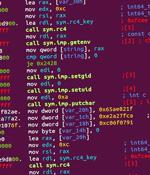Security News

The mobile threat campaign tracked as Roaming Mantis has been linked to a new wave of compromises directed against French mobile phone users, months after it expanded its targeting to include European countries. Attack chains involving Roaming Mantis, a financially motivated Chinese threat actor, are known to either deploy a piece of banking trojan named MoqHao or redirect iPhone users to credential harvesting landing pages that mimic the iCloud login page.

A previously unknown Android banking trojan has been discovered in the wild, targeting users of the Spanish financial services company BBVA. Said to be in its early stages of development, the malware - dubbed Revive by Italian cybersecurity firm Cleafy - was first observed on June 15, 2022 and distributed by means of phishing campaigns. "The name Revive has been chosen since one of the functionality of the malware is restarting in case the malware stops working, Cleafy researchers Federico Valentini and Francesco Iubatti said in a Monday write-up."

Interestingly, the expectations for a friction-free journey have made financial institutions rethink the false dichotomy between maintaining stringent security and a positive customer experience. Savvy financial institutions are realizing that they don't need to choose between customer experience and fraud loss; rather, they need to identify and implement more efficient and effective tools when it comes to verifying with whom they are conducting business.

Cybersecurity researchers have taken the wraps off what they call a "Nearly-impossible-to-detect" Linux malware that could be weaponized to backdoor infected systems. Dubbed Symbiote by threat intelligence firms BlackBerry and Intezer, the stealthy malware is so named for its ability to conceal itself within running processes and network traffic and drain a victim's resources like a parasite.

10 of the most prolific mobile banking trojans have set their eyes on 639 financial applications that are available on the Google Play Store and have been cumulatively downloaded over 1.01 billion times. These apps alone account for more than 260 million downloads from the official app marketplace.

Interpol has announced the arrest of three Nigerian men in Lagos, who are suspected of using remote access trojans to reroute financial transactions and steal account credentials. Interpol did not disclose how much money the gang was able to steal from the victimized organizations.
Meta's Facebook subsidiary has been collecting hashed personal data from students seeking US government financial aid, even from those without a Facebook account and those not logged into the student aid website, according to a research study published this week. News non-profit The Markup, working with Mozilla via its Rally data monitoring extension, found that the Meta pixel code has been gathering digital fingerprints representing the first name, last name, phone number, zip code, and email address of students filling out the Free Application for Federal Student Aid, or FAFSA, on the US Department of Education's StudentAid.

VMware released a report which takes the pulse of the financial industry's top CISOs and security leaders on the changing behavior of cybercriminal cartels and the defensive shift of the financial sector. The report found that financial institutions are facing increased destructive attacks and falling victim to ransomware more than in years' past, as sophisticated cybercrime cartels evolve beyond wire transfer fraud to now target market strategies, take over brokerage accounts and island hop into banks.

Over 42 million people in the UK had financial data compromised. According to a release from international law firm RPC, the financial information belonging to approximately 42.2 million people in the U.K. was surrendered due to a growing number of ransomware attacks.

Escobar mobile malware targets 190 banking and financial apps, steals 2FA codes. Mobile malware is becoming increasingly powerful against banking and financial applications, especially on Android operating systems.